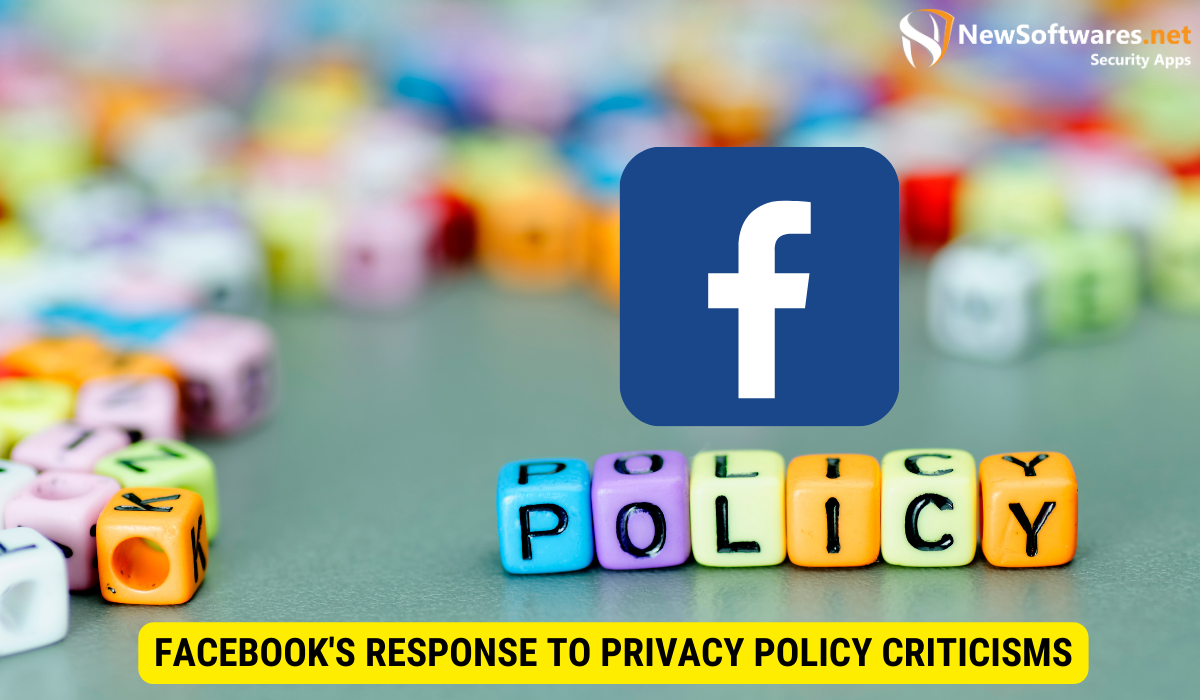Timeline of Change: Facebook revised its privacy policy on sharing friend data in response to user concerns. It introduced clearer controls, transparency, and ongoing efforts to prioritize user privacy.
Understanding Facebook’s Privacy Policy

Facebook’s privacy policy plays a crucial role in safeguarding user data and dictating how it is shared. Understanding the privacy policy helps users make informed decisions about their online presence.
The Basics of Facebook’s Privacy Policy
Facebook’s privacy policy outlines the rules governing the collection, use, and sharing of user data. It gives users control over their information by allowing them to adjust privacy settings and choose what is visible to others.
The policy also covers how Facebook may use data for targeted advertising and the measures taken to protect user data from unauthorized access or misuse.
When it comes to collecting user data, Facebook ensures transparency by providing detailed explanations of the types of information that can be collected. This includes personal information such as name, email address, and date of birth, as well as data generated through user activity, such as posts, likes, and comments.
Furthermore, Facebook’s privacy policy emphasizes the importance of obtaining user consent. It highlights that users have the right to control how their data is used and shared, and that they can revoke consent at any time.
To enhance user privacy, Facebook offers various privacy settings that allow users to customize their experience on the platform. Users can choose who can see their posts, photos, and personal information, giving them the power to maintain their desired level of privacy.
The Importance of Privacy on Social Media
Privacy is a significant concern on social media platforms like Facebook. Users share personal information, photos, and interact with others, making it essential for platforms to prioritize privacy protection.
Ensuring privacy helps users maintain control over their information, reduces the risk of identity theft, and prevents potential security breaches. It fosters trust among users, leading to a better overall experience on the platform.
Facebook recognizes the importance of privacy and continuously updates its privacy policy to adapt to evolving user needs and emerging privacy concerns. The platform invests in advanced security measures, such as encryption and secure browsing, to protect user data from unauthorized access.
Additionally, Facebook’s privacy policy highlights the company’s commitment to complying with applicable laws and regulations regarding data protection. This includes complying with the General Data Protection Regulation (GDPR) in the European Union, which strengthens user rights and imposes strict obligations on companies handling personal data.
Facebook also provides users with tools to report privacy concerns and violations. This empowers users to take an active role in maintaining their privacy and holding the platform accountable for any breaches.
The image above illustrates the evolution of Facebook’s privacy policy over the years. It showcases how the platform has adapted and refined its policies to address user concerns and align with changing privacy standards.
In conclusion, understanding Facebook’s privacy policy is essential for users to make informed decisions about their online presence. The policy’s emphasis on user control, transparency, and security measures demonstrates Facebook’s commitment to protecting user data. By prioritizing privacy, Facebook aims to create a safer and more trustworthy platform for its users.
The Evolution of Facebook’s Privacy Policy
Over the years, Facebook’s privacy policy has undergone several revisions to address user concerns and adapt to changing societal norms. Let’s delve into the key stages of its evolution.
Initial Privacy Policy on Friend Data Sharing
In its early years, Facebook provided limited control over friend data sharing. Users’ friend lists and certain information could be accessed by third-party apps, raising concerns about data misuse.
As the platform grew in popularity, so did the need for stronger privacy measures. Facebook recognized the importance of user control and took steps to address these concerns. It introduced more granular privacy settings, allowing users to control what their friends’ apps could access and strengthening permissions for third-party developers.
These changes aimed to strike a balance between social connectivity and protecting user data. By giving users more control over their information, Facebook aimed to build trust and ensure a safer online experience.
Major Revisions in Facebook’s Privacy Policy
Facebook faced significant backlash in 2010 when it revised its privacy settings, making some user information public by default. This change triggered privacy concerns and led to scrutiny from regulators and privacy advocates.
The company quickly realized the need to address these concerns and regain user trust. In response, Facebook introduced simpler privacy controls, making it easier for users to understand and adjust their settings. This shift aimed to empower users and give them more agency over their personal information.
Furthermore, Facebook implemented measures to give users visibility into who can access their data and how it is used for targeted advertising. This increased transparency was a crucial step in rebuilding trust and ensuring that users felt in control of their online presence.
Recognizing the importance of user feedback, Facebook also established channels for users to voice their concerns and provide input on privacy-related matters. This ongoing dialogue allowed the company to continuously improve its privacy policies and practices.
As technology and societal norms continue to evolve, so does Facebook’s approach to privacy. The company remains committed to addressing user concerns and adapting its policies to meet the changing needs of its global community.
Facebook’s journey towards a more privacy-centric platform is an ongoing process, driven by the desire to create a safe and secure environment for its users. By learning from past mistakes and actively engaging with its user base, Facebook strives to strike the delicate balance between social connectivity and protecting user privacy.
Implications of Facebook’s Privacy Policy Changes
The revisions in Facebook’s privacy policy have had notable effects on user experience and triggered concerns among privacy advocates. Let’s examine these implications in detail.
Impact on User Experience
Facebook’s privacy policy changes have sometimes resulted in confusion among users. Adjustments to default settings or new features have occasionally made user data more visible, generating privacy-related anxiety.
However, the company has made efforts to simplify privacy controls and provide clear instructions, ensuring users have control over their data and can tailor their experiences.
Concerns Raised by Privacy Advocates
Privacy advocates have critiqued Facebook’s privacy policy, arguing that it prioritizes monetizing user data over protecting individual privacy. They express concerns about data breaches, targeted advertising, and the potential exploitation of user information.
These concerns have prompted calls for stronger privacy regulations and increased transparency from Facebook and other social media platforms.
Facebook’s Response to Privacy Policy Criticisms

Facebook has acknowledged the criticisms and concerns raised about its privacy policy and has taken steps to address them. Let’s explore how the company has responded.
Official Statements from Facebook
Facebook has released official statements reiterating its commitment to user privacy and acknowledging the need for clearer communication. The company emphasizes its ongoing efforts to improve privacy controls and provide users with more transparency and control over their data.
Future Plans for Privacy Policy Improvements
Recognizing the evolving landscape of privacy concerns, Facebook has announced plans to continue strengthening its privacy policy. It aims to implement enhanced settings, improved user education, and increased accountability to regain user trust and ensure data protection.
Key Takeaways
- Facebook’s privacy policy plays a vital role in safeguarding user data and giving users control over their information.
- Over the years, Facebook’s privacy policy has undergone revisions to address user concerns and societal norms.
- The policy changes have had implications on user experience and raised concerns among privacy advocates.
- Facebook has responded to privacy policy criticisms by emphasizing its commitment to user privacy and announcing plans for future improvements.
- Understanding Facebook’s privacy policy is essential to make informed decisions about sharing personal information.
FAQs
Can Facebook access my personal data without my permission?
Facebook access to personal data is subject to privacy settings chosen by users. Adjusting privacy controls allows users to determine what information is visible and accessible to the platform.
How can I update my Facebook privacy settings?
To update your privacy settings, go to the Settings tab, select Privacy, and customize the visibility of your posts, personal information, and app permissions according to your preferences.
Does Facebook use my data for targeted advertising?
Yes, Facebook uses data to provide targeted advertising. However, users have the option to manage their ad preferences and control what information is used for this purpose.
Has Facebook faced any legal consequences due to its privacy policy?
Facebook has faced legal consequences and regulatory scrutiny related to its privacy practices. The company has settled with regulatory bodies and made efforts to enhance privacy controls to prevent further issues.
Where can I find more information about Facebook’s privacy policy?
Detailed information about Facebook’s privacy policy can be found on the Facebook website under the Data Policy section.
Conclusion
Understanding the timeline of Facebook’s privacy policy changes provides insight into the platform’s commitment to protecting user data. While revisions have sparked concerns, Facebook has taken steps to address them, improve privacy controls, and increase transparency. As a user, it is crucial to stay informed about the privacy settings and regularly review and update them to ensure your data remains secure in the ever-evolving digital landscape.
